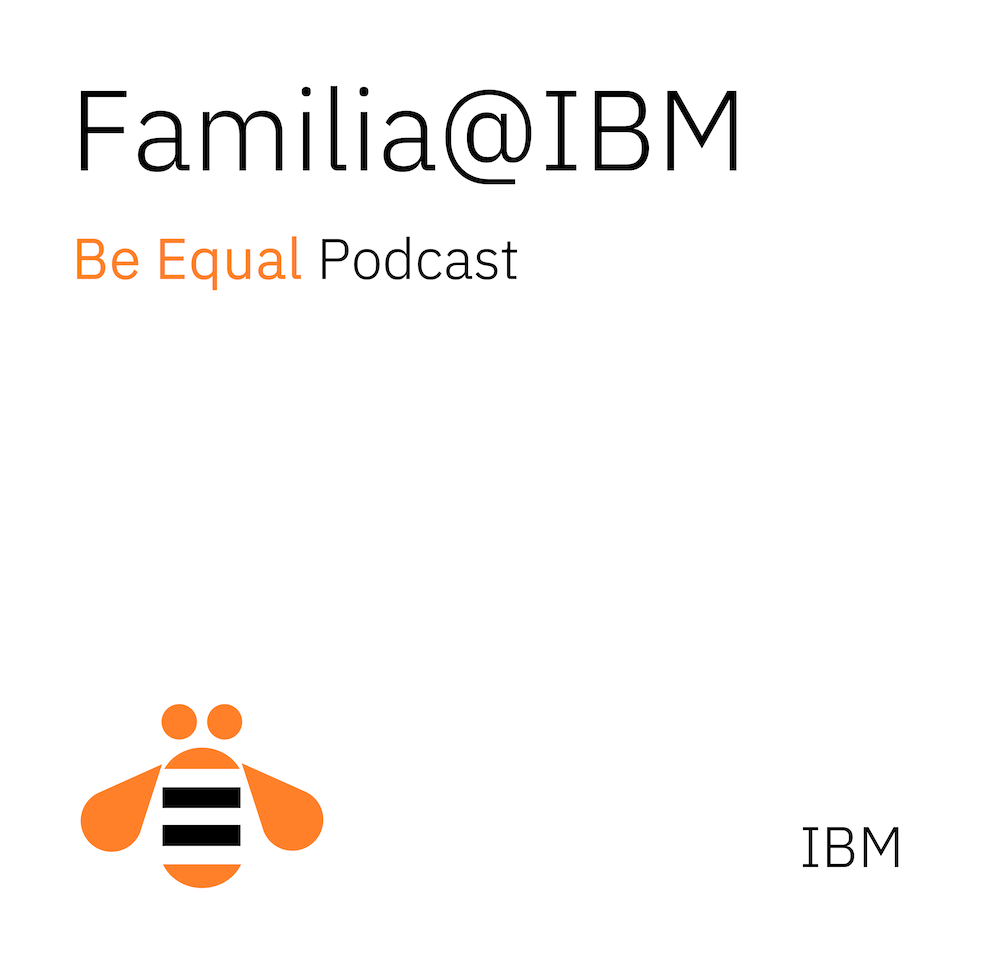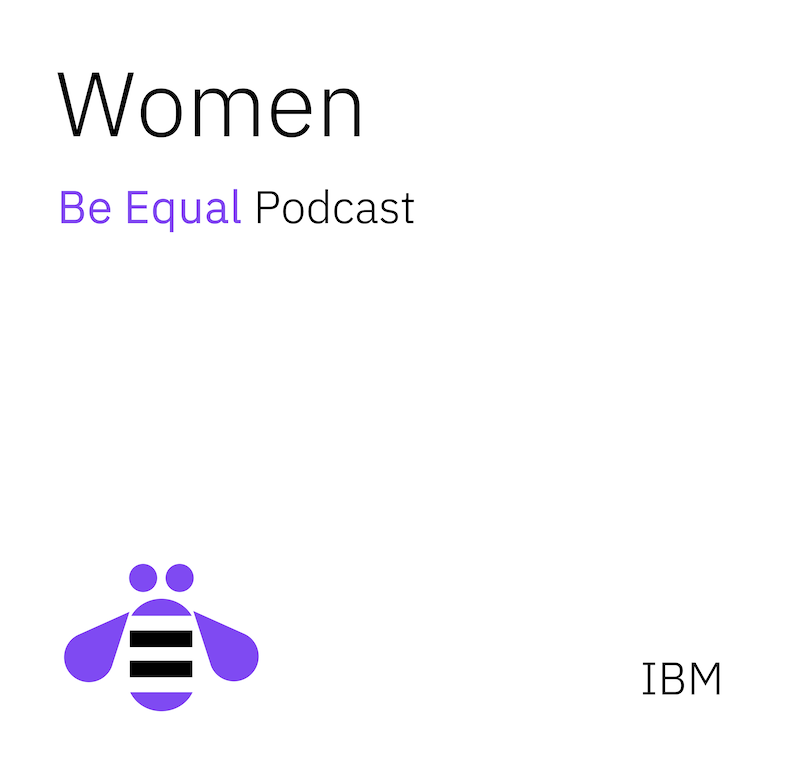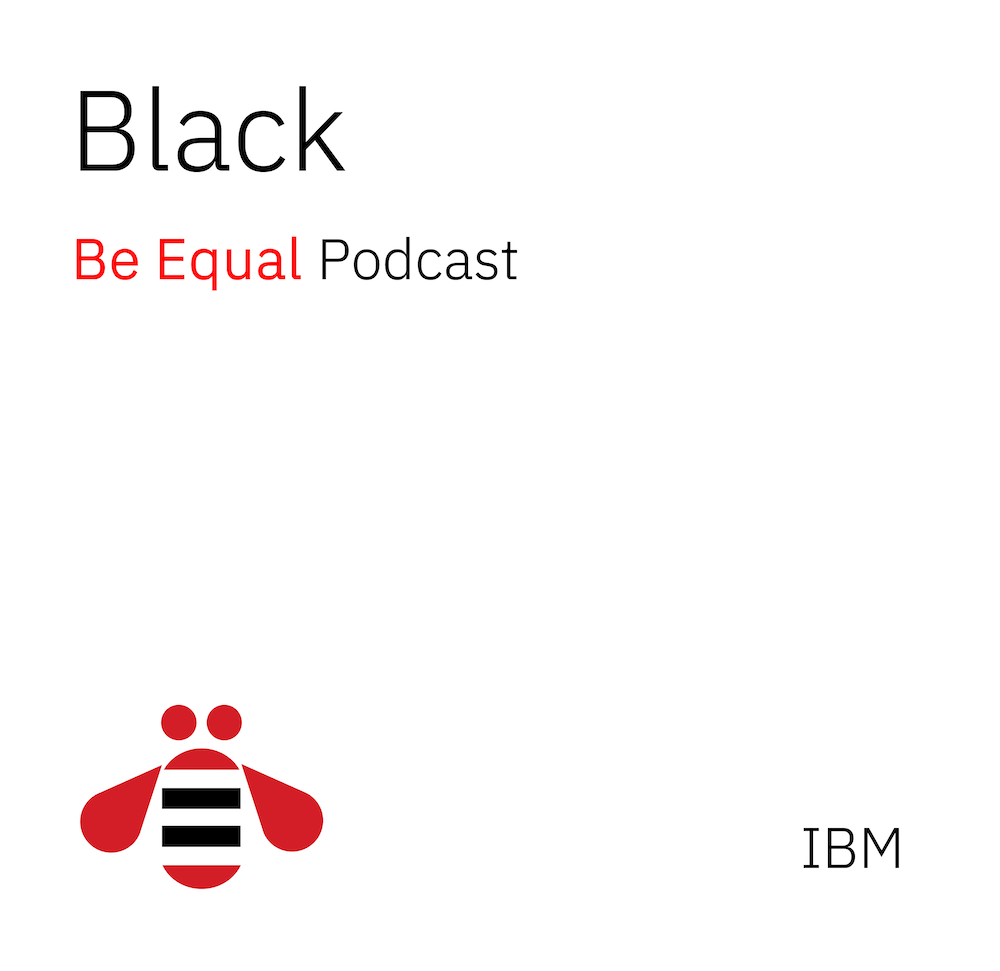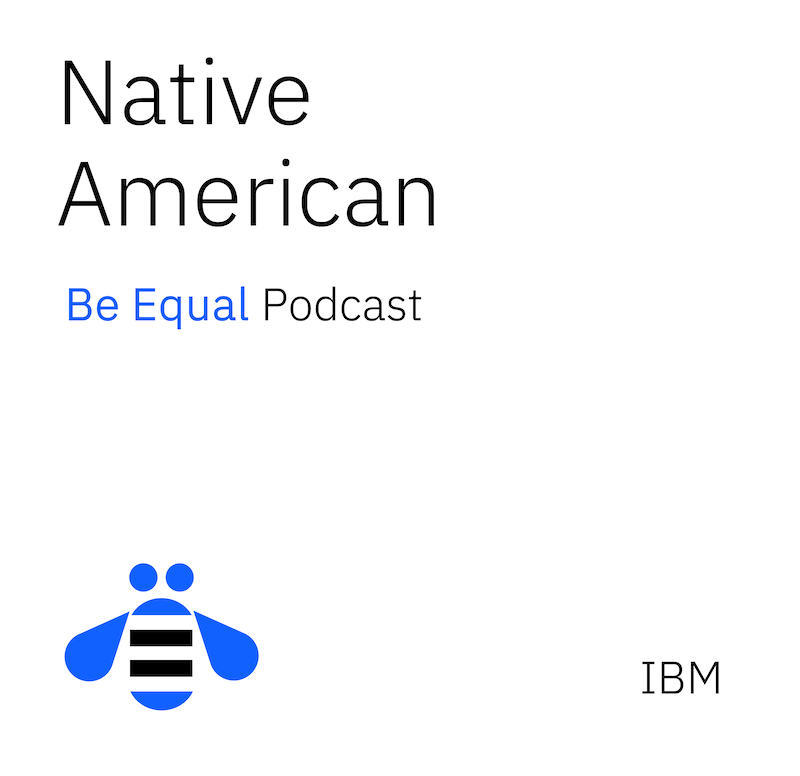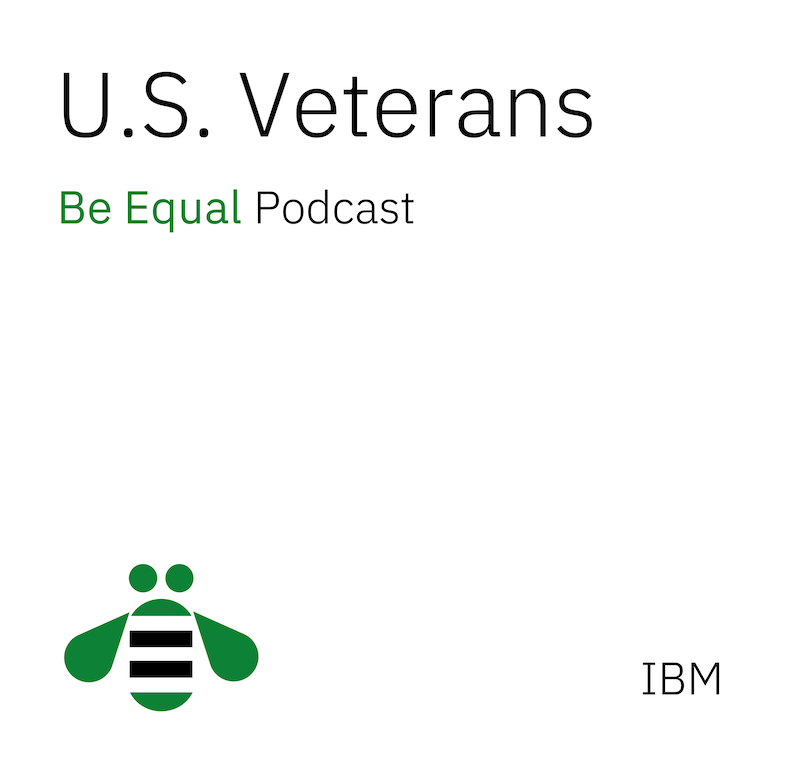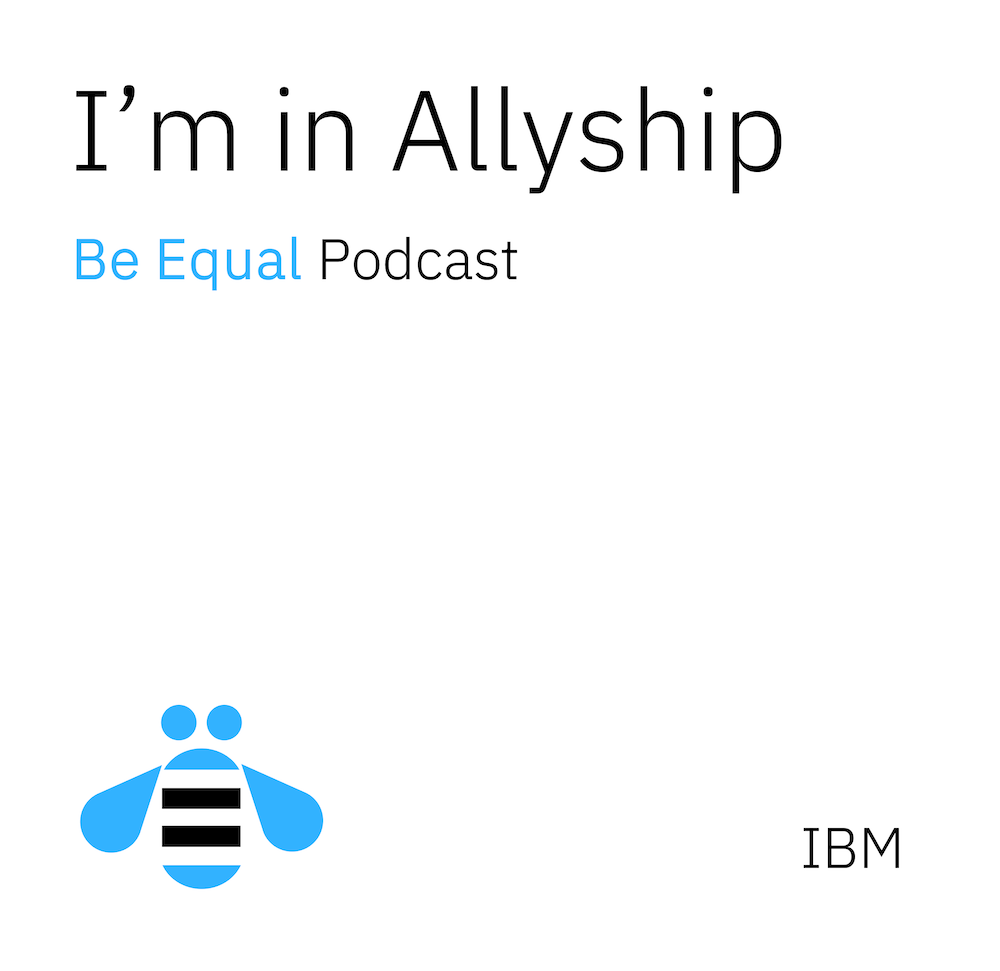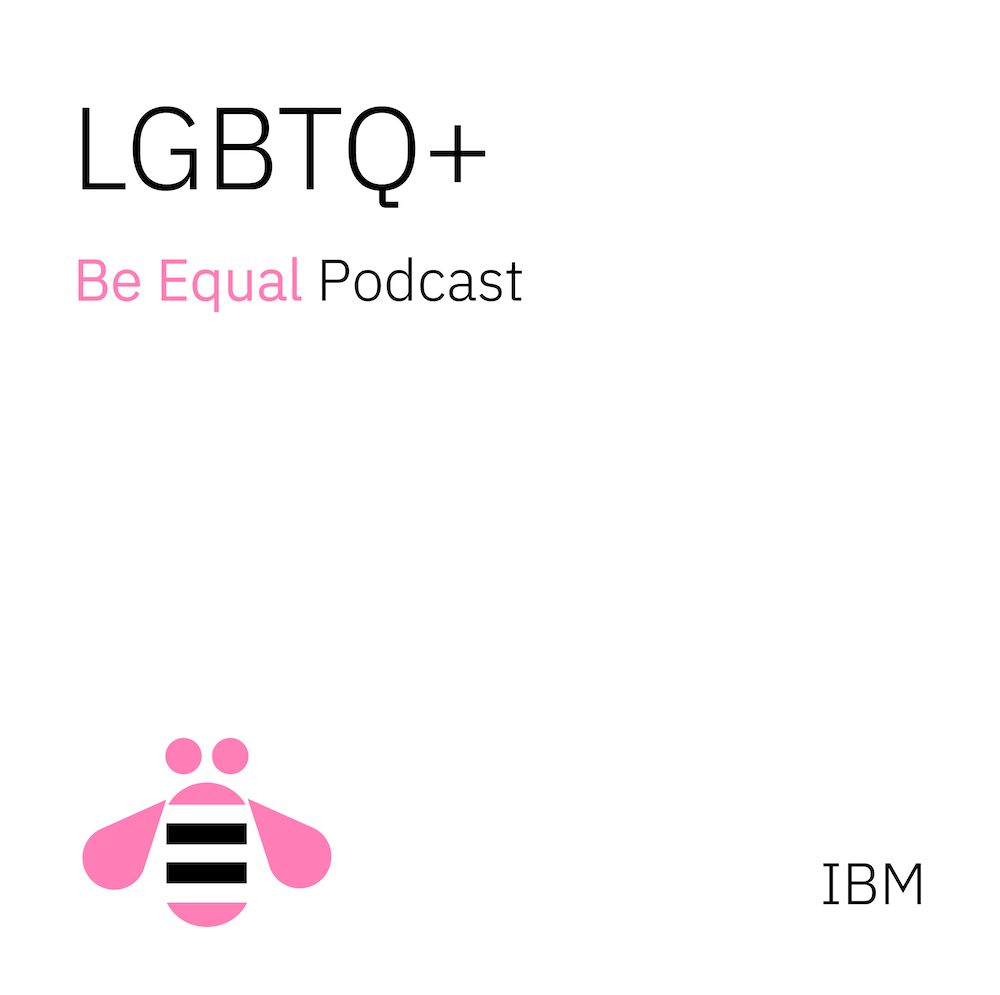Familia@IBM - Passion, Purpose and Progress
- 0.5
- 1
- 1.25
- 1.5
- 1.75
- 2
Jill Stewart: Hello, and welcome to our IBM Be Equal podcast. I'm Jill Stewart, the director of Diversity and Inclusion at IBM. Thanks for joining our conversation around D&I to learn how we, at IBM, are continuously looking for ways to expand equality and allyship across the enterprise. We have eight D&I communities focused on making a difference for underrepresented groups, and here is an opportunity for you to hear directly from our IBMers. Every month we have a new episode, so enjoy.
Joy Dettorre: Hello and welcome to this special edition of the Be Equal Podcast, where this month we will be celebrating the rich history, tradition and Latin flavor of Hispanic heritage month. The Hispanic culture has always been known for its fiery and unwavering passion, from the exuberant rhythms of salsa, cumbia, meringue, tango, raggaeton, and many others, to the intense flavors of Latin cuisine, a community where the love for music, dance, art and life itself is obvious, palpable, and always apparent. And I know because I experience it in my own home. And a big shout-out to my family from Colombia who always give me a pass every time I try to speak Spanish. I am your host Joy Dettorre, and I am the global diversity, equity and inclusion leader at IBM. My pronouns are she and her, and I'm speaking to you live from South Florida, which is also known as the ancestral lands to the Mikasucki and Seminole nations. Now, I'm especially excited about this month's podcast, as you can probably tell from my introduction, because today our listeners will hear from four IBM leaders, each with different life experiences, each with different years of tenure in the organization, and each with their own windy and unique career journey. And each of the three women on today's panel have catapulted their careers at IBM starting as interns. But one thing that you will notice that they all have in common is they will be sharing their stories of tenacity, grit, resilience, and determination. Our esteemed panelists today are Alan Torres, Ana Paula de Jesus Assis, Isabella Rocha, and Florencia Paradeda. All right, so let's get started with our introductions, so our listeners can begin to associate your name and your experiences with your voice. For the introductions, why don't you tell us three things? Number one, tell us briefly about your background. Number two, why don't you share something about your heritage. And number three, how about telling everyone about your role at IBM? So Ana, how about if we start our introductions with you?
Ana Paula de Jesus Assis: Okay, Joy, thank you for having me. I've been with IBM for 27 years now, started back in the Midwest of Brazil. I've lived in multiple countries around the world, New York, Beijing in China. Now I'm here in Madrid responsible for our Europe, Middle East, and Africa geography.
Joy Dettorre: Ana, thank you for sharing. Florencia, how about you next?
Florencia Paradeda: All right, thank you so much for inviting me to this podcast. I was born in Argentina, went to college in Argentina and started my career in Argentina. I come from a family that's also half Italian. My grandparents were immigrants from Italy, and it's very interesting for me that 70 years later I became an immigrant myself. I've been with IBM for 22 years now. I had a career that I like to describe as an adventure because it's taken me to a lot of places, four continents, and I've met some of the most interesting people you could imagine. In my current role, I'm a senior program manager in consulting. I support one of our senior executives, and I'm also very active in a lot of our diversity and inclusion initiative.
Joy Dettorre: Excellent. Florencia, thank you for your introduction. And speaking of adventures, Isa, I'm going to come over to you next.
Isabella Andreadis Rocha: Hi everyone. Thank you so much for having me here. It's an honor to take part in this initiative. My name is Isabella Andreadis Rocha, and I come from both Brazil, Greece and live and was born in London. So I'm from a multicultural background. Both my parents had backgrounds in technology and design, so that's where my passion sparked for the current role I'm working in now. So I joined IBM about a year ago. I joined as a futures intern, so I just left sixth form, which is school, and then worked for IBM for a year as a designer. From that, I loved working at IBM so much that I decided to continue as a degree apprentice with IBM. And now I am a user experience design degree apprentice. I also founded and started the Familia community at IBM in the UK and Ireland. This is a community specifically for Hispanics and Latinos, and anyone else who's interested in learning about our culture.
Joy Dettorre: Awesome. It's not often that you hear an individual say they love their job, but I heard Isa say, "I loved IBM so much," she decided to stay. And for those of you that know how important the difference between love and liking your job, when we all go home at night, we don't say, "oh, I like my spouse or my family." We say we love them. So Isa, thank you so much for your unique introduction. With that, Alan, why don't we go ahead and round out introductions with you.
ALAN Torres: Thank you. Hey everyone, my name is Alan Torres. I was born in Mexico, but I was made in the US. I came to Texas when I was 14. I'm a dreamer, I'm a DACA recipient. I've been with IBM for eight years and I've had four different careers in that time with the latest one being my current role as the diversity and inclusion leader for the Hispanic community here at IBM. And it's a pleasure to be here.
Joy Dettorre: Awesome. And Alan, I think we're going to keep the conversation with you, so you can help us set the stage. At the start of the podcast, I mentioned that we are celebrating Hispanic Heritage Month, and prior to the broadcast you shared with me a little bit about what makes Hispanic Heritage Month at IBM so special. Do you want to tell our listeners a little bit more about what IBMers can expect from Hispanic Heritage Month this year?
ALAN Torres: I would love to. The theme for this year, Hispanic Heritage Month at IBM, is passion, purpose, and progress. And the reason that we picked that theme is it reflects where the community is today and where we want to be. So let's get started with passion. This year we had a global expansion. We went from having 13 employee resource groups to 18. Not only did we grow from 13 to 18, but three of those chapters are now outside of the U.S.. That is the passion that our community is bringing at a global level. And two of our guests here today are directly responsible for some of that expansion. Pillar number two, purpose. We were very purposeful this year on rebranding our community. We went from being named Hispanics at IBM, to Familia at IBM, and we did that to be more inclusive of everyone and settle the debate between the difference between Hispanic and Latino once and for all, and to be more inclusive of our Brazilian brothers and sisters. So that's number two, and we're making sure everybody knows that during Hispanic Heritage Month. And finally, progress. And we've been very, very clear about our progress and our intention here at IBM. If you take a look at the IBM impact report, you can Google it, we publish our diversity and inclusion numbers every year, and the current representation of Latinos in the US at IBM is 7%. You can look that report up on 2022. Our goal is to get that number to 9% by the end of 2024. So we've been clear about it, we had conversations with our chief human resources officer about it, and that's the reason why we picked progress as the final pillar for Hispanic Heritage Month. So that's our theme, that's the message that we're sharing with everyone, and that's the reason why.
Joy Dettorre: Wow. I thought that I had chills at the introduction and then I heard Alan talk about the theme for this year's Familia Heritage month at IBM. So I think, Alan, you might've just inspired an entire generation of listeners to inquire about how they can join a company where they can be seen, heard, and valued. Now, some of you may be wondering why I am talking about inspiring an entire generation of new people to join IBM. Here's why. For those of you who know me, I always love a good story and I also love data. I'm going to leave the stories today to our panelists, but here's some data. 6 out of every 10 Latinos in the United States, they're younger than 35, and 78% of the US new workers, they're Hispanic, so why not bring that talent to IBM? Okay, so now I'm done with my shameless plugs on why individuals who are listening today should be joining IBM. So Ana, I think I'm going to direct my first question to you. During Alan's introduction, he mentioned that one of the three themes for Hispanic Heritage Month, or Familia at IBM, was passion. Given that IBM is one of the largest global technology companies on the planet, where does your passion for technology come from?
Ana Paula de Jesus Assis: Well, it actually started with my father when he bought my first video game. Years later, he bought my first personal computer. He hired a tutor to teach me to program, then he put me in a program in school, and he was always fascinated by technology. He would take me to the movies to see Star Wars and other sci-fi movies, a geek with lots of comic books. So I think it really started in my house, in my family, and a lot of stimulation coming from my father.
Joy Dettorre: And I love that you give kind of a testament to your father and the influence he had. I will tell you, my father was a big influence on my life as well, but this is what he shared with me. He told me I was his most coachable kid. I don't know, Ana, if that meant I was the kid that needed the most coaching, but a big tribute to your dad. I have to ask, you mentioned sci-fi movies and comic books. Do you still like sci-fi movies?
Ana Paula de Jesus Assis: Oh, a hundred percent. It's my favorite genre.
Joy Dettorre: It just goes to show that our families and the tradition of families are a big part of the Familia community. Okay, so Florencia and Isa, Ana just shared about the technology inspiration from her father. You also have inspirational stories about technology that are rooted in your family experience. So let's start with you Flore. Why don't you share how the technology journey started with you?
Florencia Paradeda: I'll start by saying, I was always a strange, nerdy kid. I kept reading about science, space. I would write letters to NASA to find out about them. I would acquire knowledge out of magazines, would find these hidden books in the house. I tell you, my parents were very confused because I was doing all these things a posh girl was not supposed to do. I would disassemble every apparatus in the house. It was just a mystery for them. But I now look at my mother, my mother is 75 years old. She's woman with four college degrees, obtaining her last in her sixties. Not only that, she was the one who bought our first computer in the house, a Commodore 64. And she was a full- time mom that taught herself to code in the eighties. So I know this constant curiosity for learning, love for technology, comes a lot from her. I like to tell her that she's also a nerd, she just doesn't know.
Joy Dettorre: First of all, a big shout-out to your mom who earned her last degree at 60. Talk about an inspiration. Florencia, I would love to one day read all those letters that you sent to NASA, and if anybody from NASA is listening, I'd love to know what happened to those letters, and did they inspire any existing astronauts? And the fact that you self-identify as a strange, nerdy kid. For every listener who is out there who says, "I identify," I think you also inspired another generation maybe who's not even thinking about entering into the workforce yet, but thank you again. Another opportunity for chills up my spine. So Isa, I also heard you mention that you wear that geek label as a proud badge of honor, too. Can you share your passion about your unique technology journey?
Isabella Andreadis Rocha: Yes. So my journey is a bit similar to Ana's and also Florencia's. So my passion for technology also came from my dad. He also worked in technology and design, and my mom a photographer. So that's where my passion for creativity and design and technology kind of came from. So I was kind of naturally drawn to problem solving and also collaborating, and this is all part of IBM and the design community here. So I had diverse interests in subjects such as art, psychology, and geography. I also took Portuguese A level in school, and if you join all these together, psychology and geography, and art, these all make user experience design. They're all very similar. So to confirm my passion for design, I decided to gain more experience, so I did some work experience and then built an online portfolio. I also did lots of online courses to try and understand if I actually do want to do this as a career. And from that, I decided to join the Futures Program at IBM. So this is an intern program that is straight after school. I left and worked for a year at IBM to know if I actually do want to work here as a designer, and I fell in love with my role and decided to continue as a degree apprentice. So despite being labeled a geek in school, it was a label that is connoting negative things, but now I wear it proudly because I have a passion for technology and design, and that's one thing that's always defined me. So now I'm very excited to continue my journey and I'm happy to be called a geek because I just am.
Joy Dettorre: I think I echo the sentiments of every IBMer out there, and every company who wished they had you, we have you. Thank you for bringing your well-rounded experience to IBM. Thank you for choosing us, and thank you for being a part of the IBM family. Big shout out to all of our parents who were tremendous inspirations to us. So Ana, I'm going to circle back to you with another question. You also shared with us, Ana, that you started your career at IBM. So I want to go back to this whole concept and the theme of passion. So, starting your career at IBM, you then progressed to becoming a general manager of IBM in Latin America. But I also understand that you love the challenge of taking on new roles, and you spent some time as the vice president of software in China. Can you tell us a little bit about your experience going from working in Latin America, and moving to a senior role as a female to China?
Ana Paula de Jesus Assis: Yes. It was almost like a sci-fi movie as well in the sense that it was the feeling of landing on a completely different planet. I didn't know anyone in China. I didn't speak the language. I had never been to China before actually going on an assignment. So it was a combination of courage with a little bit of naivety, with a little bit of curiosity. Of course, China was and continues to be an important country in terms of innovation, growth, and opportunities. So for me it was the combination of bringing my expertise in software to that team, but also a great opportunity to learn and to be at the center of what was going on at the time with China really becoming a powerful country in terms of development of innovative technologies.
Joy Dettorre: And Ana, the idea of this concept of, you wanted to be a learner, right? You demonstrated one of our biggest growth behaviors, which is always have the tenacity and the courage and the curiosity to keep learning. And what a great opportunity, as you mentioned. I love that you mentioned courage, curiosity, and opportunity. So for all of our listeners out there, no matter where you are in your career, the idea and the passion of those three, I don't think they ever go away.
Ana Paula de Jesus Assis: Absolutely. That's what keeps you going, and I think that's what will keep the doors being open to you. I think the doors are open when you demonstrate that you really have that passion inside of you to go for more.
Joy Dettorre: And talk about being a role model for those of us who are in the mantra of, " just do it afraid." The fact that you said, "I didn't know anybody in China," and you didn't speak the language and yet you still had the resilience and determination to go to a place where you knew no one. So I just have to tell you, that is the epitome of courage. So thank you for that.
Ana Paula de Jesus Assis: You're very welcome. And listen, I am always a little bit skeptical of this concept of role model. I prefer to see this as showing the possibilities, because I think everyone has their stories, each person has a different background, a different set of motivating factors. I always like to give my story, or share my story and give my example more as an example, as I said before, of the possibilities of what you can achieve if you want to, than really being what you have to do to get to somewhere. And to me, that's the thing. I do believe that we are limitless. And I do believe that, especially in this company, at IBM, IBM can open the world for you if you want to. So it's showing the art of the possible, and I think that this is what everybody needs to understand. What are the things that motivate you? What are the things that you want to do? And I can assure you that you are in the right company to achieve your dreams.
Joy Dettorre: And it all goes back to one of our themes, right? Following our passion, our purpose, and understanding the need for progress. So thank you for that, Ana. Okay, Flore, I'm going to ricochet things back to you. You and I have had the discussion about the importance of context, connecting dots and always seeing the big picture. When you first moved into your current role, it was absolutely a big career shift for you. So how did you prepare for this new responsibility?
Florencia Paradeda: You're right, I have done some interesting career switches, and the last one was probably the most different one. I am someone who likes to picture the big map. I need a map of process. And every time I go into a new role, first I understand the organization's mission very well. That gives me the sense of purpose but also gives me a good way to understand how we are going to measure success. And that's usually around, are you achieving your mission the way you should be? I like to understand where the organization sees the main risks and challenges, because that will give you the opportunity to make a difference, but also will leverage how you are achieving that success you're pursuing. And the third element is people, and dynamics. And that has the sense of people within the organization and how they interact with each other, people in the surrounding organizations that become critical to your mission and how they interact. And especially if you are new to an organization, I spend a lot of time introducing myself to everyone within the organization and the surrounding organizations because I know I need that network and I need that support, too.
Joy Dettorre: Yeah, the network is such an important success metric for everybody, no matter what organization you are part of. And I love how you really narrow this down into the importance of people. I heard something recently where we've gotten accustomed to calling it emotional intelligence, and somebody was saying maybe we need to shift our mindset and actually call it relational intelligence. And I think there's a lot to be said about the human side of our business, so thank you for that. Isa, back over to you. Not only are you new to your role as you shared, but you are also new to IBM. You have shared that making focus, flexibility, and follow-through an essential part of your success. So especially for those new professionals who are starting their careers, can you share plans for approaching maybe your first, let's say 90 days on the job?
Isabella Andreadis Rocha: Yes. So for me, leaving school and going straight to work was a very big adjustment. Usually most people tend to go to university, and then from there you have work experience and then you kind of eased into the working life. School is usually very structured and planned. So you're going to have your lesson at this day, you're going to have to give your homework at this day, otherwise there'll be consequences. But at IBM, I found that the time was way more flexible and you had to do your role and keep up with the responsibilities yourself, and make sure that you are in time, and that you keep organized. So I'm quite a methodological person. I like to keep very organized, and I find that the more organized you are, the more time you'll have. So some ways that I do this to keep organized and help with my transition process, I tend to keep a list of the different things that I need to do. For example, have a list of the stuff that I need to do for the Familia BRG, the stuff I need to do for IBM, and the stuff I need to do for my degree apprenticeship. So there's a lot of juggling of different roles. And from that I use color coding techniques to then prioritize the different tasks I need to do with urgency. But I feel like part of joining IBM, you also have a lot of support, which helped me a lot. You have a lot of mentors, and now I have a careers coach and a skills coach who helps you a lot. So that helped me a lot of my transition process. So one thing I'd say is to try and keep organized, but it's also okay to make mistakes, especially if you're like me, you just left school and then you're going into work life. They are aware of that, and if you make mistakes, that's how you learn. So yeah, that's what I would say.
Joy Dettorre: I love that. And Isa, I hope I don't misquote our CEO, but at one point in one of his office hours, I think he had encouraged all of us to fail fast, but if we failed, make sure that it was a failure that people were going to write about. So thank you so much for reminding and actually living that and bringing that experience in. I found myself actually taking notes, so you don't have to be a new professional to take some of the tips that you just shared to be successful in the workplace. So Isa, thank you so much for that. I also think you said in a very polite way," there are no two days at IBM that are ever alike." All right, so Ana, let's circle back with you with another question. Based on what you've shared so far, it is obvious that you have successfully led teams across various cultures. What advice would you share with someone preparing for a role that has a multicultural scope over someone contemplating a leadership role outside of their home country?
Ana Paula de Jesus Assis: First and foremost, be humble. You are the visitor, you are the foreigner. So when you are landing somewhere else, first of all, learn how that culture operates. Two, always show a genuine intent to learn and to understand where people are coming from. Three, don't be judgmental and don't use your frame of reference to assess or make decisions. And fourth, be open. It is incredible how much support and how much help you get when people see that you are being genuinely open to them, to their culture, to their way of seeing the world.
Joy Dettorre: And Ana, you bring up such a great point because IBM does business in more than 170 countries, and even though we might not travel to another country, we are constantly interacting with colleagues maybe in a country where we don't have familiarity. So I think those are wonderful words to live by, and I'm going to summarize them. I think you said it's, "be humble," number one. Number two, "be genuine in your intent to learn." Number three, "don't be judgmental." And number four, "be open." Okay, Isa, similar question as Ana.
Isabella Andreadis Rocha: So there's four things I'd like to say. The first thing, as being both a Latina and Greek, and also live in England, I have noticed that there's a lot of different ways to communicate with different kinds of people, and there's a lot of different variations in work approaches. For example, for me, when I go and greet my family in Brazil or Greece, you hug them, you give them a kiss on the cheek. Sometimes it's one, sometimes it's two, sometimes it's three. But here in England, if you are to go and hug someone and give them a kiss on the cheek, then it's a bit of a shock. So that's one of the things you have to keep in mind. The second thing is, to succeed in a multicultural leadership, or kind of leading that way is to prioritize clear communication. Especially myself, sometimes I find some words hard to understand, so to try and keep it simple and if they don't understand, be okay to explain to them again in a way that they might understand better. Also, encourage diverse perspectives, and show respect to the different cultural diversities and backgrounds as well. That's very important. Some things I'd give you as a tip to prepare is to learn about the cultures you're working with, to actively seek inputs from your team members from various different backgrounds, and to also foster inclusivity, which is really important. And some of the important qualities you have to also remember and practice is patience, empathy, and also make sure that you continue to learn from the different experiences you encounter.
Joy Dettorre: Wow, I don't even know the best way to summarize that. Let me try. I think your advice was, "learn about different cultures, seek the perspective from others, foster inclusion," and it was patience, empathy, and what was the last one?
Isabella Andreadis Rocha: And to continue learning and growing, and learning with the different experiences you have.
Joy Dettorre: Awesome, I love that. Thank you so much. I'm actually taking notes. This is such a reciprocating way of learning today, so thank you so much, Isa. All right, so let's round up this question with you, Florencia. Maybe you can share your feelings about being authentic in those situations, overcoming fear and embracing the unexpected.
Florencia Paradeda: I completely agree with what Ana and Isa said, and I'll say that openness, authenticity, and willingness to learn is the key to success. Because if you come to a team and you have a different background, a different perspective, a different set of experiences, I guarantee you have something to offer that the team needs. And that's the wonder of diversity, right? That's been my experience. The second point I will suggest is you have to be open and learn, and you'll learn about the environment and other cultures, but you will learn a lot about yourself also, because you're going to be facing different situations that you have never faced before.
Joy Dettorre: I'll say one thing about all of our panelists, the importance, this theme of learning, and although none of you have used the word, it's such deep introspection. So thank you so much for sharing your comments.
Florencia Paradeda: And I have one more.
Joy Dettorre: Go ahead, Flore.
Florencia Paradeda: I think it's very important, and I'm going to quote something I learned from your Colombian family, Joy.
Joy Dettorre: Yes.
Florencia Paradeda: This concept of, don't be afraid - no tienga miedo. Always facing a new culture, a new challenge can be scary sometimes, but you cannot be afraid. You have to be ready to face those situations, find the kind way to stand your ground if needed, and overcome those special situations without fear. Fear will paralyze you and kill the trust. So those are my three items to wrap up this one.
Joy Dettorre: Wow. I will say, Florencia, I know nobody can see me, but I sure did get a lump in my throat as you give honor to somebody you know who is so important to me, who has been an inspiration to your career and a loving part of my family. Thank you for making it personal for me. All right, Florencia and Isa, let's circle back with you about Hispanic Heritage Month at IBM for 2023. As Alan mentioned in his introduction, IBM was very intentional about renaming Hispanic Heritage Month to Familia at IBM, so that employees around the globe would see themselves as part of this celebration. So Isa, I'm going to come over to you. You identify with a multicultural background, living in the UK, a person who identifies as Greek and Brazilian. Would you say that being Latina has made it easier or harder for you to lead in multicultural context, and tell us why, and how it links to your work about Familia in the UK, our business resource group there?
Isabella Andreadis Rocha: Yes. So I joined IBM and I was looking at the different BRGs we had, and myself and two others decided to found and actually put together the first Familia BRG, first Latina and Hispanic BRG here at IBM in the UK and Ireland. I found that this was very special to me because it was a way for me to connect with other Hispanics and Latinos and get to know other people in IBM like myself. When I joined, it took me about three months just to meet these other two Brazilians that worked on the exact same floor. So this way it was a perfect way for me to be able to bring people together, and make people feel like they belong and are included and part of the family, which is why the name is called Familia. And as a Latina myself, I find it hard to fit in sometimes because I don't know if I'm fully Brazilian, fully Greek, fully English, but... It's quite difficult. But building this community together with the other two Brazilians really helped me find my place and feel closer to my culture, and as a Latina myself, which is very important to me.
Joy Dettorre: I love how you said, "finding your place, celebrating your culture and having familiarity with others." I think it's so beautiful. And you actually heard Isa talk about IBM's employee resource groups. We call them business resource groups, and that's because it was intentional about referring to them as business because of their unique way that they contribute to our corporate commitments, they align with our strategy around inclusion, and they help us create signature employee experiences where IBMers live and where they grow. And so I wanted to go ahead, and Flore, circle back to you with this same question because I know it's very personal to you. Can you share how you demonstrate your advocacy for diversity, equity, and inclusion at IBM's workplace?
Florencia Paradeda: I'll say that when I came to the U.S. I got very much involved with the LGBT community, and you and I have collaborated in that a lot. This is because we all have a story and that had been a challenging journey for me. I found the safe space at IBM and I wanted to be a part of it, and help the community. But as you go through experiences, as a Hispanic woman in my case, I arrived with a mission to change an operation that needed a cultural change, and I realized the cultural gap that I have, and I navigated through it. But one day I had this thing happen to me. Someone told me, "Flore, you're so smart, I forget you're Hispanic." And that was a shock to me, because it was someone making a horrible comment to my face, believing it was a compliment.
Joy Dettorre: Wow.
Florencia Paradeda: And I realized how deep these biases go. So I decided to switch gears a bit and put some of my energy to the Hispanic community. I'm convinced that we need to focus on changing all these biases, and I'm very happy I can bring a lot of the experience I gained in the LGBT community and reshape it into the Hispanic community. Everyone in the LGBT community has really wired their minds that we need to change the system, that a lot of the progress for the community is about regulations and laws and a system that enables equality. In the Hispanic community, it's a bit different, right? It's more about personal interactions, people not being exposed to a culture. So I have been very engaged. And the main things I'm trying to do is first, activate allyship. So Alan and I have been collaborating. We have started to bring more representatives of the allyship who are not of the Hispanic community into collaborating with us as a way to start that system change. I'm also quite focused on giving space to women. You mentioned earlier that women that have this intersection of a cultural background, and outside of culture being a woman has more challenges. And when you understand the numbers in the market, in society, Hispanic, Latina women have a very big gap. So we created a specific series for Latina women to give that stage, and share the stories as great examples and inspirational examples of the struggles, the combination of being a mom, being a woman, learning, working in technology as an inspiration. So that's how I invest a lot of my energy. I would say that this volunteer work outside of my day work that I've done in both communities has given me some of the most rewarding experiences of my career. The reaction from people, young employees that have told me they even stayed longer because they connected with these programs has been great. I'm always very open to learn about other communities as well, right? I only known my own experiences as a LGBT person, Hispanic woman, but it's important for me to learn from the Black community, from the Native community, from Diverse Abilities communities, and see how we can all come together. So that's why it's my passion. That's my personal stories.
Joy Dettorre: Wow, all I can say is, as we reflect on the conversation, I'm so glad that it took a turn and wrapped itself, completely enveloped around allyship. Because what's so powerful about our podcast is that the series explores what we think of as these seemingly simple issues that we all face, but we don't always talk about them out loud. So Ana, one more question for you. There was research that was recently released in 2022 as a part of the Women in the Workplace study, and this is what they discovered. Women with traditionally marginalized identities continue to have the worst workplace experiences, and because of their intersecting identity of being a woman and a person of color, the effects are actually compounded. Now, you have always been an advocate for diversity, equity, and inclusion, and specifically, you have dedicated your energy and your passion for sponsoring women and helping them advance. But what practical tips do you have for any leader who may be listening on how they can put that into practice in their day-to-day?
Ana Paula de Jesus Assis: First of all, understand that this is a priority that has to be aligned with your business objectives. This is not just CSR (Corporate Social Responsibility), this is not just doing good. This is about mirroring the society that we live in. I was recently in Greece, for example, and I visited many clients there in government agencies. And unfortunately, there were no women in the rooms. And when I was with the Minister of Labor, I mentioned this to him. I said, "listen, we need to create a program here around skills that drives women inclusion in the society, because you're not going to be able to sustain progress if you don't have more women in the workforce, in the sectors that represent growth," and technology is one of those sectors, right? So I think that we have this responsibility to advocate in a way that is practical, tangible, and that also connects with the business outcomes so that you have really a strong set of supporters, and you have a stronger network that will make those aspirations happen. Otherwise, it just becomes a set of objectives without an actual outcome.
Joy Dettorre: And Ana, there's something that you said that I think is important for every leader out there. And by the way, leaders, you don't have to have the manager title to make a difference in your organizations. You can influence through your own behavior. And I'm a big believer that we are the difference between somebody's very good and very bad day just based on how we behave. "We have the power in each one of our own organizations to create space for women, to ensure progress." That's your quote, by the way. So thank you for letting me steal it. I stole it shamelessly, by the way. Now Ana, this final question is for you. One of the themes for this year's Hispanic Heritage Month is purpose. Thinking back on your own career and the impact that you have made on thousands of IBMers across various countries, what brings a sense of purpose to you personally in your work?
Ana Paula de Jesus Assis: I love developing potential. That is a thing that drives me every single day. Every day I wake up, and when I'm thinking about the opportunities I'm working on, the deals I want to bring to the company, it's how I make IBM place where people can really achieve their goals, where people can reach their dreams. And that can only happen if you are in an environment that is growing, and that is opening the spaces for people to thrive. And that's what motivates me. That's my purpose.
Joy Dettorre: And I will say, Ana, there are not a lot of people, when they're talking about work, who use the word love. Although there is some interesting research about love, and I'll share what it is. There's an article written by the Harvard Business Review, and it was entitled, Employees Who Feel Love Performed Better, and this is what they described. Love is not a word that you often hear uttered in office hallways or conference rooms, and yet it has a strong influence on our workplace outcomes. The more love coworkers feel at work, the more engaged they are. Now, I will say that there was some criticism initially to the article because the individuals that were surveyed actually worked in the healthcare industry. And so people said, "well, yeah, you work in healthcare, of course we would expect you to respond that way." So the researchers went back, and they decided to turn this study into a longitudinal study. It was actually 16 months, and their new study was called What Does Love Have to Do With It? And essentially what they did was they redid the study, they talked to more than 3,201 employees across seven different industries, and they, again, looked at this whole concept of feeling love in the workplace. And this is what their longitudinal study discovered. People who worked in a culture where they felt free to express affection, tenderness, caring, and compassion for one another were, number one, more satisfied with their jobs. Number two, more committed to the organization. And number three, more accountable for their performance. So for those of us who think that that four letter word of love is something we shouldn't bring into the workplace, maybe we should spend a little bit more time researching studies like this one.
DESCRIPTION
From Sept 15-Oct 15, we celebrate the many contributions of the Hispanic & Latin Familia community to IBM and to the world. Tune in to hear from IBMers Dr. Joy Dettorre, Ana Paula Assis, Florencia Paradeda, and Isabella Andreadis Rocha as they share their personal journeys, experiences and heritage, marked by the unique qualities of grit, resilience and determination, all while thriving in IBM's multicultural environment. Discover the theme of Hispanic Heritage Month for the Familia@IBM community, "Passion, Purpose and Progress", as discussed by Alan Torres to learn how this group has evolved and its vision for the future as part of the company.
Today's Host
Jill Stewart
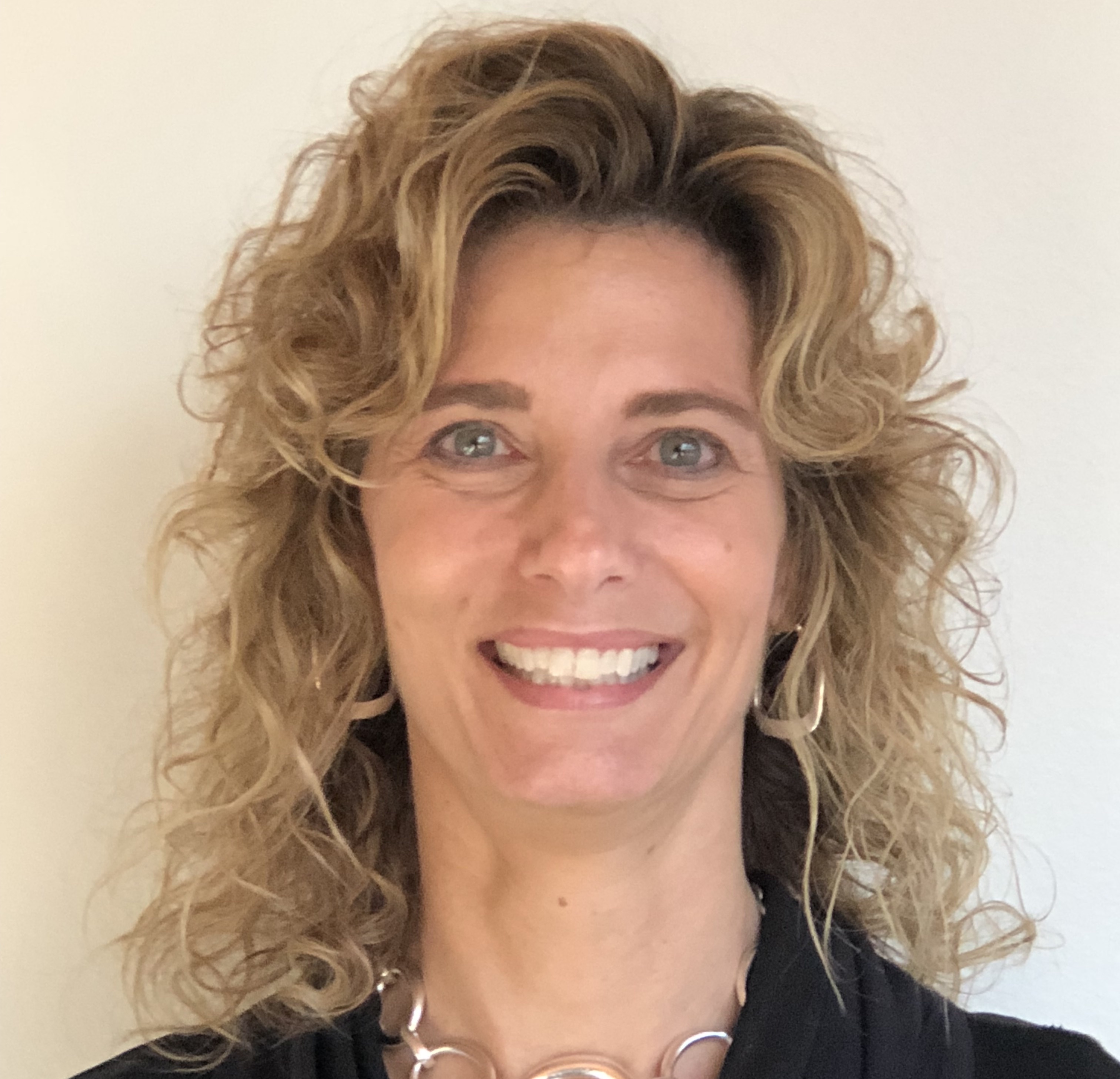
Joy Dettorre
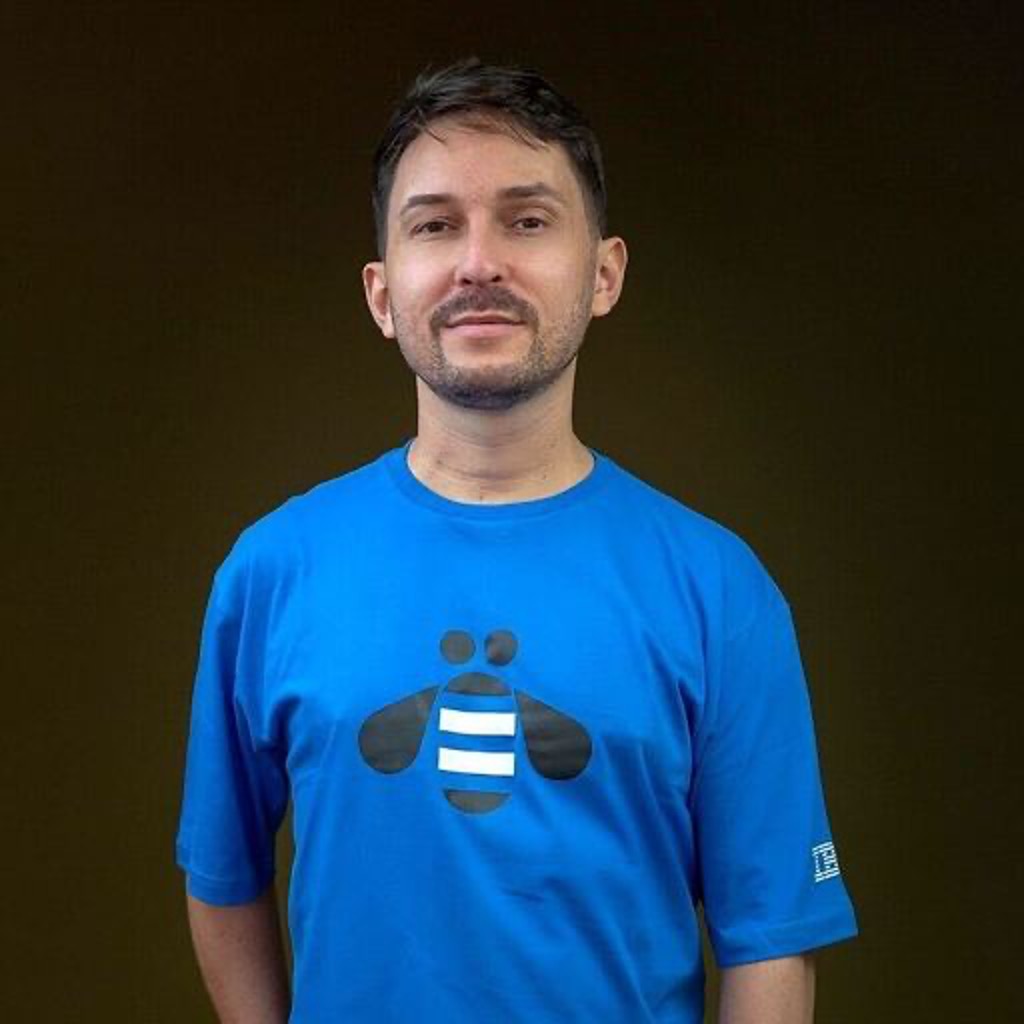
Luiz Lopes
Today's Guests

Ana Paula de Jesus Assis

Isabella Andreadis Rocha
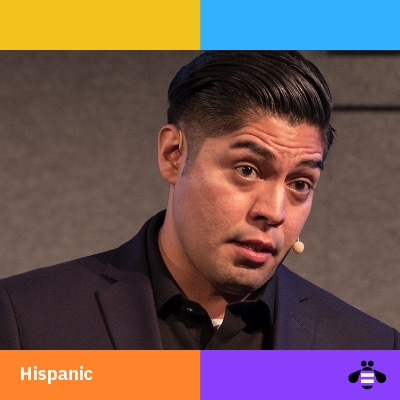
Alan Torres


